 India-US
India-US
Baseless reports targeting India: Barriers to New Delhi-Washington strategic relations
The United States has long positioned itself as the global guardian of democracy, freedom, and human rights, seeking to spread these values around the world.
This approach, often shaped by American interests, has been a cornerstone of its foreign policy.
While this may work with some nations, it can also alienate those with distinct cultural, historical, and political contexts.
A recent example of this dynamic is the United States Commission on International Religious Freedom (USCIRF) and its persistent targeting of India, an essential strategic partner to the US.
The USCIRF, a bipartisan body within the US government, routinely releases reports critiquing India on issues of religious freedom.
These reports not only misrepresent India’s complex social fabric but also risk undermining the growing strategic partnership between the two democracies.
By focusing on India’s internal religious matters, often without adequate understanding of its constitutional framework, the USCIRF jeopardizes the mutual trust essential for cooperation between the world’s two largest democracies.
India’s strategic importance
In today’s shifting geopolitical landscape, India is an indispensable partner to the US With Russia reasserting itself and China posing an emerging challenge, India plays a critical role in balancing power in Asia.
New Delhi’s economic growth and its willingness to engage in strategic alliances have made it a natural ally for Washington.
However, India is equally determined to maintain its autonomy in foreign policy decisions—a stance evident in its continued relationships with both Russia and China, despite pressures from the West.
India’s stance is not about resisting the US, but rather about upholding its sovereignty and strategic independence.
While the US views India as a pivotal partner in containing China’s influence, the USCIRF’s biased annual reports on India’s religious freedom issues only serve to strain this relationship.
USCIRF reports: Misrepresentation and bias
The USCIRF’s recent reports have been notably critical of India, particularly over issues like the Citizenship Amendment Act (CAA), anti-conversion laws, and the Uniform Civil Code.
These critiques, however, ignore the nuanced socio-political landscape within India and the constitutional measures it takes to address religious and communal issues.
The Citizenship Amendment Act, for example, is a humanitarian effort aimed at providing refuge to persecuted minorities from neighboring countries, a context often missing from the USCIRF’s analysis.
Similarly, the commission’s stance on India’s anti-conversion laws and cow-slaughter bans reflects a fundamental misunderstanding of India’s federal structure and state-specific policies.
In a country as diverse as India, where religion intersects with politics, culture, and identity in intricate ways, such blanket criticisms seem not only misinformed but harmful.
It reduces complex national debates into oversimplified narratives of oppression, which not only misrepresent India but also inflame domestic tensions.
Moreover, the commission has repeatedly accused the Indian government of promoting misinformation and hate speech against minorities, particularly Muslims.
Such allegations, especially when issued without thorough understanding or context, fuel mistrust between India and the US.
A one-sided narrative?
It is ironic that the USCIRF, a body based in a nation grappling with its own human rights challenges, takes such a self-righteous position on India’s internal affairs.
The United States itself faces issues of systemic racism, police brutality, hate crimes, and religious intolerance.
From the long history of violence against Native Americans to recent civil rights violations against Muslim women, the US is far from being a flawless bastion of religious and social harmony.
Reports of hate crimes against Jews, Muslims, and other minorities in the US are rising, yet these are not given the same level of international scrutiny.
For example, the US Constitution does not fully secure the rights of women and girls, as evidenced by child marriage still being legal in many states.
Similarly, there are numerous reports of Muslim women having their hijabs forcefully removed while in police custody.
These instances highlight that religious freedom issues are not unique to India, and yet, the USCIRF chooses to disproportionately target India while downplaying issues within the US.
The larger impact on US-India relations
India’s Ministry of External Affairs has consistently rejected the USCIRF’s reports, asserting that they lack credibility and are based on biased sources.
While India and the US continue to cooperate on several strategic fronts, the persistent focus on religious freedom, especially when misrepresented, risks overshadowing the progress being made in other areas.
The USCIRF’s stance could create unnecessary barriers in India-US relations at a time when both nations need each other to navigate a challenging global order.
Criticism of India on religious grounds by American bodies like the USCIRF creates mistrust and suspicion.
These reports not only damage India’s reputation internationally but also alienate a key ally.
It raises a critical question: should US government bodies be allowed to publicly criticize a strategic partner on issues as sensitive as religious freedom, especially when those criticisms are rooted in misunderstanding and bias?
A path forward
For the US-India partnership to flourish, mutual respect for each country’s internal sovereignty and complexities is essential.
Instead of allowing organizations like the USCIRF to undermine bilateral relations, both nations should focus on areas of convergence—trade, defence, climate change, and technology.
Criticism should be constructive, not punitive, and must consider the broader implications for international diplomacy.
Reports like those of the USCIRF, if left unchecked, will continue to act as barriers to deeper cooperation.
It is in the interest of both India and the US to ensure that these barriers do not derail a partnership that is crucial not just for the two nations, but for global stability in an increasingly multipolar world.
(The opinions expressed in this article are those of the author. They do not purport to reflect the opinions or views of Khalsa Vox or IBNS)
Support Our Journalism
We cannot do without you.. your contribution supports unbiased journalism
IBNS is not driven by any ism- not wokeism, not racism, not skewed secularism, not hyper right-wing or left liberal ideals, nor by any hardline religious beliefs or hyper nationalism. We want to serve you good old objective news, as they are. We do not judge or preach. We let people decide for themselves. We only try to present factual and well-sourced news.







